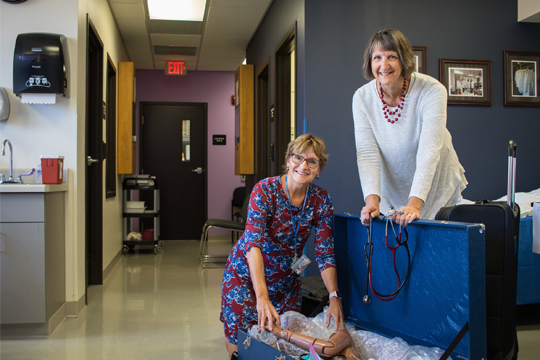 Assistant Professor of Nursing Cathy Cero-Jaeger and School of Nursing Dean Dr. Sharon Chappy pack supplies for a trip to Tanzania.
Assistant Professor of Nursing Cathy Cero-Jaeger and School of Nursing Dean Dr. Sharon Chappy pack supplies for a trip to Tanzania. It’s the old adage of teaching a man to fish instead of simply giving him the meal.
Four Concordia University Wisconsin nursing faculty are among a group of seven Wisconsin nursing professors who have been traveling to Africa on three-week rotations for the past seven months to teach Tanzanian nursing instructors how to better educate students.
The effort is part of the Touch Foundation’s Treat & Train Network. Started in 2004, the international non-profit combines the best of private and public sector approaches and expertise to improve the health of Tanzanians by strengthening the country’s health system. Treat & Train specifically leverages the combined resources of the hospitals and educational institutions in the network to achieve systems-level improvements for under-resourced health facilities in Tanzania.
The end goal of Touch’s latest effort involving CUW nursing professors is to help two schools of nursing in Tanzania produce nurses who are more proficient in clinical skills and reasoning when caring for patients. The country’s government officials in partnership with nursing education leaders identified that Tanzanian nurses graduate adept in their theoretical knowledge, but lacked in clinical performance standards.
So the Touch Foundation turned to exemplary models in Wisconsin to help turn the tide.
“It will require a fundamental shift in how they’ve been approaching teaching clinical courses,” says Dr. Sharon Chappy, dean of Concordia’s School of Nursing, and one of the CUW faculty members who is part of the effort. “It will require that the government or school leaders invest the necessary funds to support its nursing students; but if they can allocate and sustain the funding necessary to support clinical learning, , it is going to make a drastic difference in the health care delivery system in that country.”
Chappy and Cathy Cero-Jaeger, assistant professor of nursing at Concordia, recently returned from a trip overseas. Cero-Jaeger, who also made a trip in May, as part of the team conducting a needs assessment, worked at Catholic University of Health and Allied Sciences and Bugando School of Nursing, to help set up skills labs, complete with hospital beds and low-fidelity mannequins where students can practice hands-on skills such as inserting IVs.
Chappy spent her trip working with school and hospital leaders to plead the case for a new approach to teaching and learning. She talked through methodologies and structures put in place at CUW and demonstrated their success.
“I think we made a lot of progress on this last trip, but the schools of nursing and the hospital have very limited resources,” said Chappy. “Everyone was eager to learn, and they understand they need to improve how they teach students in the clinical setting, Yet, changing procedures and sustaining efforts with such limited funds make the work challenging. We assisted faculty to learn more student-centered approaches to teaching that do not cost money; the faculty need to teach differently.”
Concordia’s involvement is made possible by the Milwaukee Global Health Consortium, a nonprofit whose goal is to develop and connect the global health programs and activities of its member organizations, which include Concordia, UW-Milwaukee, the Medical College of Wisconsin, Aurora Health Care, Marquette University, Froedtert Hospital, Children’s Hospital and Health System, the City of Milwaukee Health Department, Milwaukee County Government, the International Institute of Wisconsin and the Rotary Club of Milwaukee. It was MGHC that connected Concordia and UW-Milwaukee nursing faculty so that the two institutions could submit their proposal to the Touch Foundation.
In addition to Chappy and Cero-Jaeger, the other Milwaukee-area nursing faculty members who are involved in the Tanzania effort are Concordia Assistant Professor of Nursing Dr. Jill Krell, Concordia Simulation Coordinator Kathi Lengyel, UW-Milwaukee Nursing Professor Emeritus Ellen Murphy, UW Milwaukee Clinical Assistant Professor Carol Klingbeil, UW Milwaukee Clinical Instructor Angela Lang.
Chappy and Murphy will return to Tanzania in spring for the final evaluation. While the group’s efforts have mostly focused on donated time and expertise rather than goods, the team did bring books and other donated lab supplies on each trip. Chappy and Cero-Jaeger also transported two low-fidelity mannequins and two over-sized suitcases with general medical supplies on their flight over.
“We had the pleasure of lugging two 55-pound trunks through the airport because it was cheaper to check the mannequins as baggage than it was to ship them, believe it or not,” Cero-Jaeger laughed.
The mannequins, which were sold at a reduced price by the Wisconsin manufacturer Nasco, cost $1,440 each. To ship them would have cost around $4,000 each, said Cero-Jaeger.
It’s all part of the cost of providing high-quality instruction for nursing students, says Cero-Jaeger.
“It is easier to deliver health care than it is to teach faculty to teach student quality nursing care,” Cero-Jaeger said. “Our philosophy though is that this is going to be sustainable for them after we leave. They have to buy into this, and I think they did.”
— This story is written by Kali Thiel, director of university communications for Concordia University Wisconsin and Ann Arbor. She may be reached at kali.thiel@cuw.edu or 262-243-2149.
If this story has inspired you, why not explore how you can help further Concordia's mission through giving.